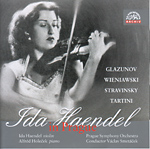Ida Haendel was a remarkable violinist whose stunning technique continues to impress today. More than just rich, solid tone, pinpoint intonation, and razor-sharp attacks, Haendel’s playing is distinguished by the life-affirming verve she brings to whatever work is before her. She imbues Glazunov’s concerto with a dark intensity and urgency of utterance, yet in the finale her playing suggests a brightly glittering Russian holiday. In the Wieniawski, Haendel combines virtuoso bravura with tender lyricism to make for a uniquely compelling rendition. The remainder of the program provides a more intimate encounter with Haendel’s art, displaying impressive rhythmic acuity in Stravinsky’s Divertimento followed by Tartini’s Devil’s Trill sonata, where Haendel tosses off the finger-busting runs without breaking a sweat. The recordings, made in the 1950s and ’60s, sound clear, with substantial dynamic impact (even the mono Stravinsky). However, as was the custom, Haendel’s violin dominates the acoustic. In sum, a highly enjoyable violin program, and an excellent introduction to this remarkable artist.
































